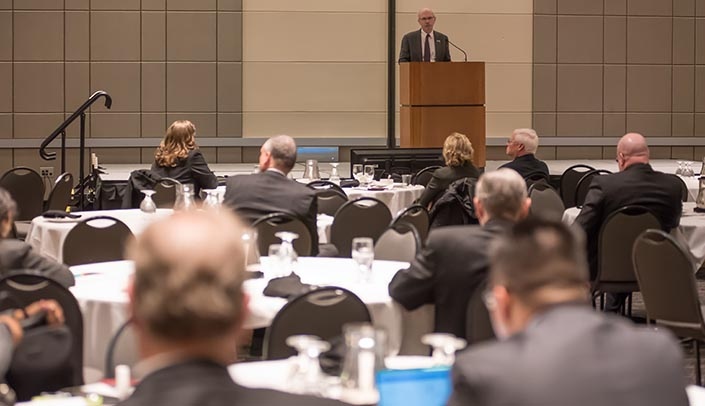To achieve success, diversity must be deliberately embedded into the policies, practices and programs of an organization.
That was the message from Joan Reede, M.D., one of five speakers at UNMC’s April 4 Breakthrough Thinking Conference.
The annual conference, organized by the UNMC Chancellor’s Office, is designed to challenge and inspire attendees to creatively solve problems and, as Chancellor Jeffrey P. Gold, M.D. said, “think big thoughts.”
Watch video on the Breakthrough Thinking Conference
As dean for diversity and communication partnerships at Harvard Medical School, Dr. Reede provides leadership, guidance and support to promote the increased recruitment, retention and advancement of underrepresented minority faculty. “Unless we embed the importance of diversity in our thinking, we will not achieve diversity inclusion,” she said.
To make her point, Dr. Reede showed images that appear after Googling such terms as ‘smart people’ and ‘professor.’ Caucasian faces dominated each of her slides.
“We need to think differently from the start,” she said. “We need to think through a diversity inclusion lens.”
Dr. Reede encouraged attendees to:
- Consistently ask: Who is not at the table?
- Assume ownership of the issue – “we need to speak up for all of us, not leave it to the disabled person to speak for themselves,” she said, as an example.
- Create a mindset change from “I recruited a talented minority” to “I recruited a talented individual.”
- Raise awareness of unconscious bias.
- Be deliberate in efforts to retain and recruit: Create a mentoring culture, increase the individual’s visibility, be aware of the reach of their internal network, and nurture and support them. “We got here because somebody helped us, taught us. So I ask you, who are you helping?”
Life takes different turns, she said, so programs at Harvard have multiple points of entry, exits and reentry. They also are flexible and responsive to emergent environmental and policy changes, as well as local needs, she said.
“We have to be serious about diversity inclusion and expect the same kind of rigor that we expect in everything else in academia,” she said.
